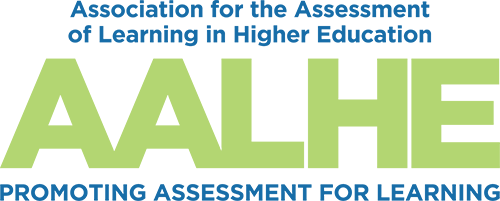- Home
- About AALHE
- Board of Directors
- Committees
- Guiding Documents
- Legal Information
- Organizational Chart
- Our Institutional Partners
- Membership Benefits
- Member Spotlight
- Contact Us
- Member Home
- Symposium
- Annual Conference
- Resources
- Publications
- Donate
EMERGING DIALOGUES IN ASSESSMENTApplying Sports Analogies to Motivate Assessment
May 17, 2019 David Turbow and Jeanne Gillespie McDonaldAssessment is a process of inquiry rooted in questions of "how are we doing?" and "how can we improve"? Unfortunately, some faculty express that outcomes assessment initiatives heighten their workload unnecessarily and yield irrelevant data and artifacts. Because negative conceptions of assessment are difficult to displace once entrenched, those fundamental questions that drive the process of assessment to improve student learning risk getting set aside. Within these mental models, the connection between performance and feedback is interrupted, even subverted, and teaching, or the dynamic of teaching and learning, is often viewed as unquantifiable. However, we quantify all sorts of dynamic performances like the scoring of athletic performance in the Olympics. While the score does not tell the whole story of an athletic performance, it does provide insight into the preparation, mindset, and collaborative work of athletes and coaches. In this article, we address how sports analogies can help academic teams conceptualize the intent and endeavor of outcomes assessment through the creation of mental models which connect formative feedback to performance. The use of analogy can be a highly effective method of promoting conceptual change (Clement, 2013, pp. 412-446). Successful analogies are ones that allow for deep relational elements yielding both differences and commonalities (Gentner et al., 1997, p. 6). Sports analogies can be especially helpful as they are performance based, mental models of dynamic systems and, as such, provide useful comparisons to the teaching and learning process, and they allow for fresh, coherent explanations of the assessment process by and for assessment practitioners. Athletic performances, as dynamic systems, are characterized by interdependencies much like teams of students and faculty as well as institutional teams responsible for assessment. Therefore, a closer examination of some examples of sports analogies reveals the complexity of and kinship with the assessment of teaching and learning. During Spring 2018 Faculty Development Days at Waubonsee Community College, Dr. McDonald and her team used some of their scheduled assessment time to work on the mental models of assessment faculty and administrators held. There were incomplete along with negative concepts of assessment as being an add-on rather than an integral part of teaching and learning improvement, so they devised a strategy to address these issues. They distributed copies of Chicago Cubs manager Joe Maddon’s whiteboard that he drew up with the team during spring training in preparation for the 2016 year that resulted in their World Series win (see Figure 1). They highlighted some of the commonalities of the phrases Maddon wrote in preparation for the mental stress to prepare for the upcoming season, such as: "The Process Is Fearless," "Do Simple Better," and "Embrace the Target." They envisaged these words of motivation for their current situation of preparing for the inaugural institutional-wide data collection and reporting. It was clear that mental preparation was as vital as it was for the Cubs. This corollary experience provided opportunities to contemplate the dynamic process of assessment. Faculty seemed more receptive to the work at hand. Even now, as she circulates among faculty offices, she sees the poster taped to their walls and file cabinets as a reminder of the mindset for assessing teaching and learning. When building outcomes assessment efforts at health professions institutions, Dr. Turbow has found that faculty and administrators tend to be health-conscious people who can naturally relate to sports examples. For example, after setting an over-40 personal best in the one-mile run, he witnessed true historical greatness as then 8-yr. old Jason Parra set a world record in the event (see Figure 2). When asked by the race director how he was feeling at that moment, Parra, with the crowd and his proud father (and coach) Jessie nearby, replied that he felt “congratulated”. Then, when asked how he got so fast, Parra replied that he “practices a lot”. When asked about his next goal, Parra at the time stated that he wanted to set another world record. As with sports performance training, great assessment work is not easy, it is never done, and there is always more that can be accomplished. For Turbow, sharing photos of true inspirational events, and photos of teams being coached can be used to convey the purpose and benefits of assessment as well as the physiological dimensions of learning. Learner-centered assessment can be achieved when faculty focus on collaboratively building consensus around their expectations and standards of judgment towards a criterion-referenced approach, a structured process described by Maki (2004), Allen (2006) and others. When assessment leaders exhibit respect for the disciplinary expertise of faculty and create an appropriate context of safety in which to hold conversations about assessment, faculty may experience a shift in perspective--from an individual instructor who imparts her or his specific knowledge, into a coach or guide who facilitates student learning--providing opportunities to practice with formative feedback for improvement. Importantly, conducting assessment initiatives effectively requires faculty, staff and administrators to connect with one another, and to exhibit empathy when analyzing and reflecting on evidence gathered. This requires us to think collectively about how we can best structure the learning environment for students in a manner that is at once increasingly challenging and nurturing of student success. When conducted cohesively, assessment efforts invite and incorporate student feedback about programs and courses, resulting in improvement to curriculum and teaching. The sporting world provides a wealth of inspirational examples from which to draw upon where athletes and teams struggle or fail and human beings practice resiliency with the help and encouragement of coaches and trainers. Anecdotally, applying sports analogies works optimally when the facilitator brings context, background, and authenticity to groups of people, thus motivating their teammates in continuous improvement efforts. The cumulative effect of sports as analogous to the assessment process is to deepen practitioner and institutional appreciation for the relevance of assessment to teaching and learning. The mindsets of athletes and teachers are foundational as they share the dimensions of dynamic performances. Likewise, the assessment process provides another layer of dynamic process by quantifying student performance, taking into account the qualitative context, for the improvement of teaching and learning. FOR DISCUSSION: Have you tried applying sports examples to motivate assessment efforts at your institution? If so, then how was it received by faculty and administrators? Which sports analogies do you feel lend themselves most naturally to assessment discussion? We are interested in learning more about your experiences.
Allen, M. (2004). Assessing academic programs in higher education. San Francisco: Jossey-Bass. Clement, J. J. (2013). "Roles for explanatory models and analogies in conceptual change." In S. Vosniadou (Ed.) International handbook of research on conceptual change (Educational Psychology Handbook). Routledge. Gentner et al. (1997). "Analogical reasoning and conceptual change: A case study of Johannes Kepler." The journal of the learning sciences, 6(1), 3-40. Groesser, S. N. (2012). "Mental models of dynamic systems." In N.M. See (Ed.). The encyclopedia of the sciences of learning. (Vol. 5, pp. 2195-2200). New York: Springer. Maki, P. (2004). Assessing for learning: Building a sustainable commitment across the institution. Stylus Publishing, LLC. Wulf, S. (2016, Oct. 7). Maddon’s prophetic speech guides Cubs to postseason. ESPN Online. http://www.espn.com/mlb/story/_/id/17558425/joe-maddon-spring-training-message-cubs-proves-prophetic. Authors: Dr. David Turbow is Director of Institution Research and Assessment at American University of Health Sciences, Signal Hill, CA. Dr. Jeanne Gillespie McDonald is Professor of English and faculty liaison for outcomes assessment at Waubonsee Community College, Sugar Grove, IL. |


